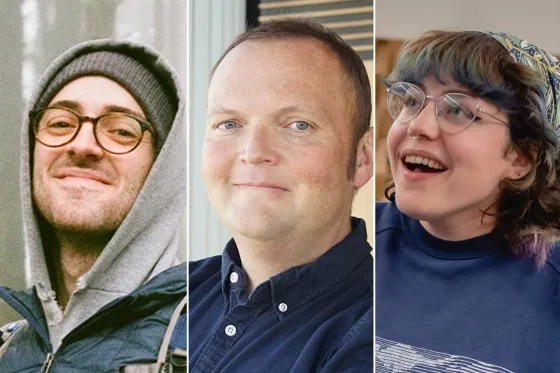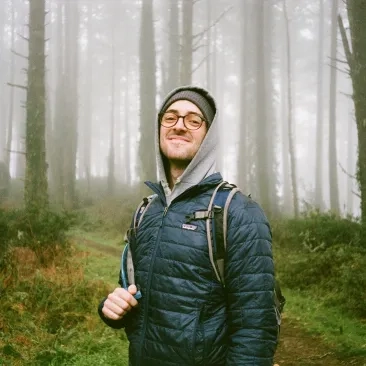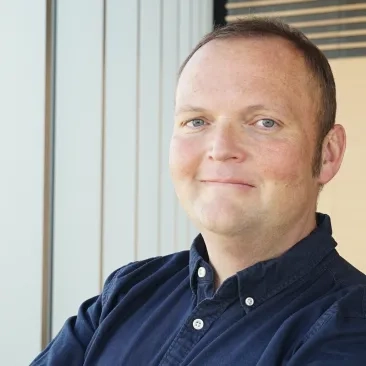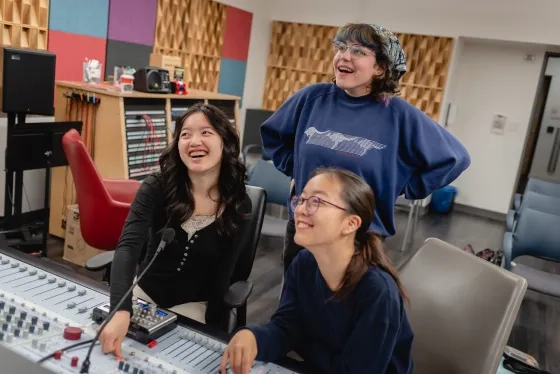Meet the Team that Records (Almost) Everything Played at SFCM
The Conservatory's Director of Recording Services, GRAMMY-winner Jason O'Connell, is supported by engineers Cory Todd and Emma Markowitz.
A week of recording at SFCM might see everything from a guest ensemble of traditional Chinese musicians to an array of synthesizers to a full-sized symphony orchestra, but the Conservatory's Recording Services department is more than up to the task.
SFCM's Director of Recording Services for 16 years, Jason O'Connell, is supported by engineers Cory Todd and Emma Markowitz (both alumni). Aside from overseeing the recording of student ensembles, masterclasses, guest performers, and the school's original video content with faculty and students, the three all teach in classes and one-on-one settings in the Technology and Applied Composition (TAC) department and the Conservatory's Pre-College Division.
Interestingly, all three of them come from a performance background: O'Connell in viola, Todd in jazz bass, and Markowitz in pop vocals and percussion. And all three talk about—after various levels of being introduced to the recording side of music-making—realizing that a career as a performer wasn't for them. In Todd's case, he went through a performance degree, during which he said "I was very intent on just being a bass player: hired gun, sideman style. As I graduated, I started rethinking that—which is amazing timing to change your mind about your career, but I think I just got restless. Bass is a very important instrument, but I'm very passionate about music in a lot of different ways and I don't think I realized that until I had really wrung that towel dry." Moving to New York with a band he was playing with, he started getting experience as a live sound engineer, before he applied to the PSD program in TAC.
For O'Connell, that epiphany came after a severe injury to his left- hand ring finger he sustained during a fall while hiking in Vancouver that occurred after he had been accepted into SFCM for a master's in viola.
"I actually ended up getting back to playing shape," he recalls. "I did a cruise ship gig and I worked in a string quartet, but I realized during that time that I did not want to play music professionally." After earning a master's in recording, he continues, "I did an internship at a studio in Belgium that also specialized in death metal. Then I was working at a classical studio in Amsterdam, the one Pentatone still uses to this day. I had an internship with the Philadelphia Orchestra next, and while there, I got an offer to record SFCM's New Music Ensemble under Nicole Paiement. Two weeks later I saw the Director of Recording Services position open and I asked Nicole about it, and ended up getting the job. And that was 16 years ago." (Pentatone Records is part of the alliance SFCM leads with artist management companies Opus 3 Artists and Askonas Holt.)
O'Connell also wound up working for the San Francisco Symphony thanks to his familiarity with Pyramix—a digital audio workstation that makes it easier to work with classical recordings that aren't tracked to a consistent click track—via his work with Pentatone. He continues to oversee the engineering of recording sessions and edit and mix the Symphony's performances, work which now includes the spatial audio mixes for Apple Music. (It was in this capacity that O'Connell picked up a GRAMMY, for his work on SFS' celebration of Michael Tilson Thomas' 25th and final year as Music Director, From the Diary of Anne Frank & Meditations on Rilke.)
For Markowitz, who arrived at SFCM in the first wave of the COVID-19 pandemic, shadowing O'Connell as he was setting up the Conservatory's groundbreaking Dante Audio Networking System (which allows ensembles to play together while adhering to isolation and social distancing guidelines) was a formative experience. "It led me to spending a lot of time in the basement with Jason, so I basically just followed him around and asked questions," Markowitz recalled. "And he was always there to say, 'Okay, let's do a little mini-lesson and we can learn how the patch bay works.' I didn't know that he had a GRAMMY until like, two years into knowing him."
The entire staff is equally enamored of the teaching and discovery process. "I started out having no idea what I was doing," Markowitz says, "so I really like encouraging people to get the confidence to use these tools, because I think they can be super-intimidating." Todd says, "We have people coming in with zero experience, so there's a ton of juggling and a ton of delegating according to skill sets. That's actually one thing I really like about this job—that you get to know the students really well, and help them develop. It's just so cool when you teach them to do something and then two weeks later they're better at it than you are."
Many students in the TAC program arrive there—like O'Connell, Todd, and Markowitz—from a performance background, O'Connell says, and wind up getting drawn further in. "There's a lot of students who take some recording classes while they're doing their degree, and then all of a sudden they're like, 'this is amazing.' Or they think, 'I have these skills on the music side, and then if I just develop these technical skills and combine them…' That is exactly what happened to me— I had musical skills and I was decent, but not amazing. But once you add the technical skills in and you can combine those two, all of a sudden you have the skill set that very few people have."
"Jason is always our backup because he knows everything," Todd says, but he and Markowitz run point on most sessions, overseeing students as they set up. Everything from microphone placement to deciding which software to use to score supervision is on the table for a TAC student working on a session, and the recording department all get equally excited discussing the various learning opportunities that come through their department.
"I feel like I'm always learning at this job," Markowitz says. "There's just always a new thing to learn and always a new person to record. I think if I didn't work here, I probably wouldn't have the motivation to try to work on things in my own time because you're surrounded by students who are constantly full of ideas."
It's reductive to say that every session is different, but there's much more that goes into them than microphone selection, Todd explains: "What's the main personality? What are the other personalities in the room? What's the nature of the work? Where would a student thrive and where would they not? I like that it's so variable."
Talking with the three of them, aside from their joy about the teaching and learning processes, it's clear the recording department is tight-knit. "Both Cory and Emma are amazing," O'Connell says. "I think the great thing about our staff is that Cory's a mastering engineer and much more into electronic music, and Emma's a vocalist, so between the three of us, we cover a lot of bases. It's a great working environment, and then when we bring the students into the mix, so to speak, it's really fun."
Learn more about studying Technology and Applied Composition at SFCM.



